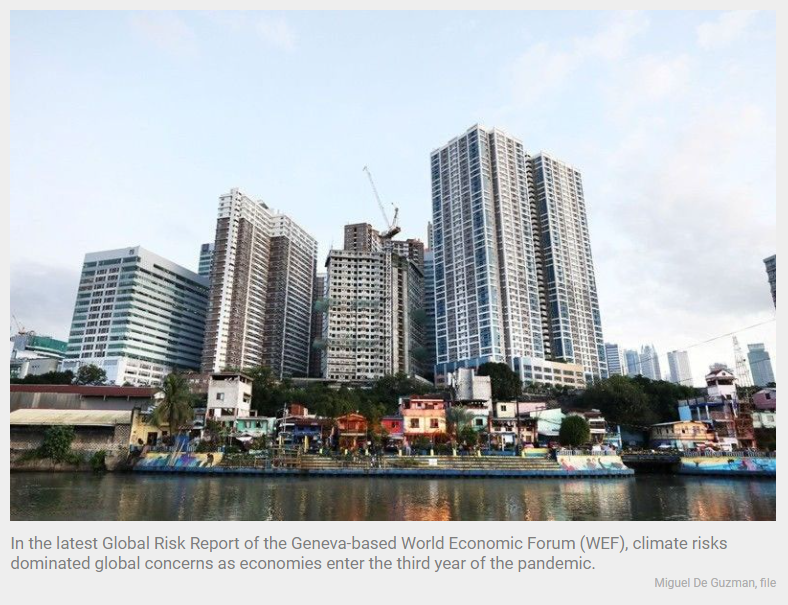Philippines: Economic stagnation, climate woes top risks for Philippine WEF
MANILA, Philippines — The difficulty of the economy in recovering from the pandemic and the worsening climate crisis are among the top risks the Philippines is facing in the near term.
In the latest Global Risk Report of the Geneva-based World Economic Forum (WEF), climate risks dominated global concerns as economies enter the third year of the pandemic.
WEF refers to “global risk” as the possibility of the occurrence of an event or condition that may cause significant negative impact for several countries or industries.
For the Philippines, specifically, prolonged economic stagnation was the top risk in the next two years that the WEF identified.
This pertains to a near-zero or slow economic growth lasting for many years.
“Risks to economic growth are considerable, including risks from a potential resurgence of COVID-19 as new variants emerge,” the WEF said.
“Most experts believe a global economic recovery will be volatile and uneven over the next three years,” it said.
Experts earlier warned of the possibility of economic scarring in the country as many businesses have closed since the pandemic, resulting in job and income losses.
Cases of health insecurities, especially among the poor, and the disruption in education are also factors that would likely affect productivity and human capital.
Apart from economic stagnation, extreme weather events pose another risk for the Philippines. This includes loss of human life, damage to ecosystems, destruction of property and financial loss.
Globally, the top three risks all pertain to the environment: climate action failure, extreme weather and biodiversity loss. Human environmental damage and natural resource crises are also among the top 10 risks.
“Densely populated countries that are highly dependent on agriculture—such as India, Nigeria, Pakistan and the Philippines—are especially vulnerable to climate insecurity,” WEF said.
WEF emphasized that the climate crisis remains the biggest long-term threat facing humanity and failure to act on climate change could shrink global gross domestic product by a sixth.
Further, another risk for the Philippines is digital inequality or the unequal access to critical digital networks and technology. This results from the unequal investment capabilities, lack of necessary skills in the workforce, insufficient purchase power, and government restrictions.
The last two risks for the Philippines are under the societal category: employment and livelihood crises and failure of public infrastructure.
The first involves the structural deterioration of work prospects and standards for the working-age population such as unemployment, underemployment, lower wages, fragile contracts, and erosion of worker rights, among others.
“The economic fallout from the pandemic is compounding with labor market imbalances, protectionism, and widening digital, education and skills gaps that risk splitting the world into divergent trajectories,” WEF said.
“Many countries will be held back by low rates of vaccination, continued acute stress on health systems, digital divides and stagnant job markets,” it said.
Failure of public infrastructure, on the other hand, is the unequitable and insufficient public infrastructure and services as a result of mismanaged urban sprawl, poor planning and under-investment, negatively impacting economic advancement, education, housing, public health, social inclusion and the environment.
While the top long-term risks relate to climate, the top shorter-term global concerns include societal divides, livelihood crises and mental health deterioration.
The outlook for the world over the next three years remains tilted to the downside with 41.8 percent believing that recovery will be consistently volatile with multiple surprises.
Some 37.4 percent also expect fractured trajectories while only 10.7 percent sees accelerating global recovery.
Source: https://www.philstar.com/business/2022/01/13/2153480/economic-stagnation-climate-woes-top-risks-philippine-wef


 English
English




